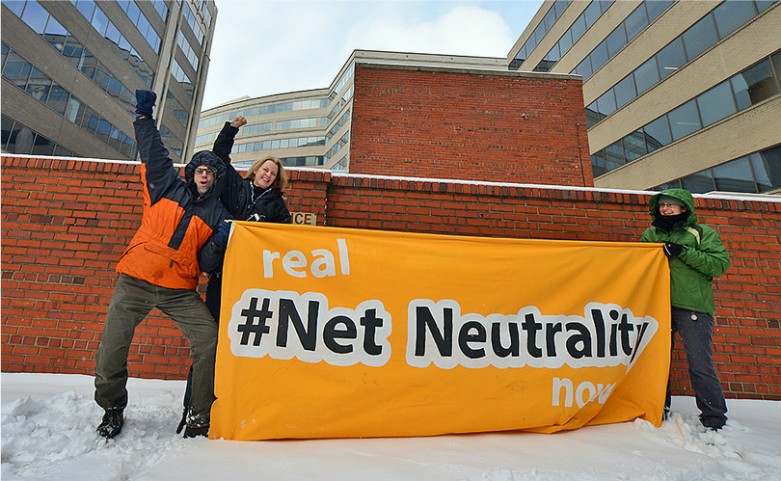
The Free Press Action Fund Urges the House of Representatives to Stop Trying to Undermine Net Neutrality
Net Neutrality rules prevent broadband Internet access providers, such as Comcast, AT&T and Verizon, from unreasonably discriminating against or blocking lawful content and applications. This principle has always governed the Internet, ensuring a robust Internet economy and a level playing field for all voices online.
In February 2015, after a year-long rulemaking process that drew a record-breaking number of public comments, the FCC voted to protect Net Neutrality by restoring it to the solid legal foundation improperly abandoned during the Bush administration. The vast majority of Americans — spanning the political spectrum — support these rules.
But some in Congress are trying to use the appropriations process to undermine Net Neutrality by burying three riders in Sections 628–630 of the financial services appropriations bill that funds the FCC. These sections would prohibit the FCC from protecting the open Internet.
Rep. Jose Serrano introduced an amendment striking the three provisions from the bill at the House Appropriations Committee hearing on June 17. The Free Press Action Fund and our allies are urging members of Congress to support that amendment and the removal of these provisions if the bill comes to the floor.
Section 628: Flawed Transparency Provision
This provision would require the FCC to make any final rule proposal public three weeks before voting on it. While more transparency in government is welcome, the rider improperly singles out the FCC among the civil agencies that follow the procedural laws set forth in the Administrative Procedure Act (APA). While we would be open to debate in another forum about the merits of increasing transparency under the APA, Congress should not push new technical requirements for a single agency through a 150-page must-pass bill, without public engagement. The FCC followed the APA and the Communications Act when it adopted these landmark Net Neutrality rules, and it did so with unprecedented public participation in a transparent and open process.
Section 629: Overly Broad Prohibitions That Would Harm the Open Internet and Its Users
This provision prohibits the FCC from regulating the “prices, other fees, or data caps and allowances” for broadband Internet access service. The rider is designed to look consistent with the FCC’s decisions in the Open Internet Order, which specifically declined to regulate retail rates charged to broadband customers.
But in reality this provision is so broad that it would tie the agency’s hands, preventing the FCC from acting to protect consumers and preserve the open Internet.
The language goes beyond the purportedly narrow focus on retail “rate regulation.” It could keep the FCC from guarding against fraudulent billing practices or enforcing transparency rules. It would prevent the FCC from examining the reasonableness of so-called “zero rating” schemes, which many open Internet advocates and innovators see as a way to advantage some apps with discriminatory data cap exemptions. And it could prevent the FCC from examining interconnection fees that large broadband providers impose on people who are not their customers.
It’s not “rate regulation” to prevent Comcast from levying a new toll on every website in the world, and from double charging just to deliver content that the company’s broadband customers have already paid handsomely to receive.
Section 630: Legislative Stay Would Block Rules That the Courts Refused to Delay
This provision would circumvent the courts and block the FCC from enforcing Net Neutrality rules until all appeals are resolved. On June 11, however, the D.C. Circuit Court of Appeals denied a stay of the Net Neutrality rules, allowing them to remain in place while the case works its way through the legal system. Congress should not undermine the court’s wise decision to keep these protections in place during the appeal. This kind of legislative stay would cause further uncertainty in the market and jeopardize Americans’ rights online.